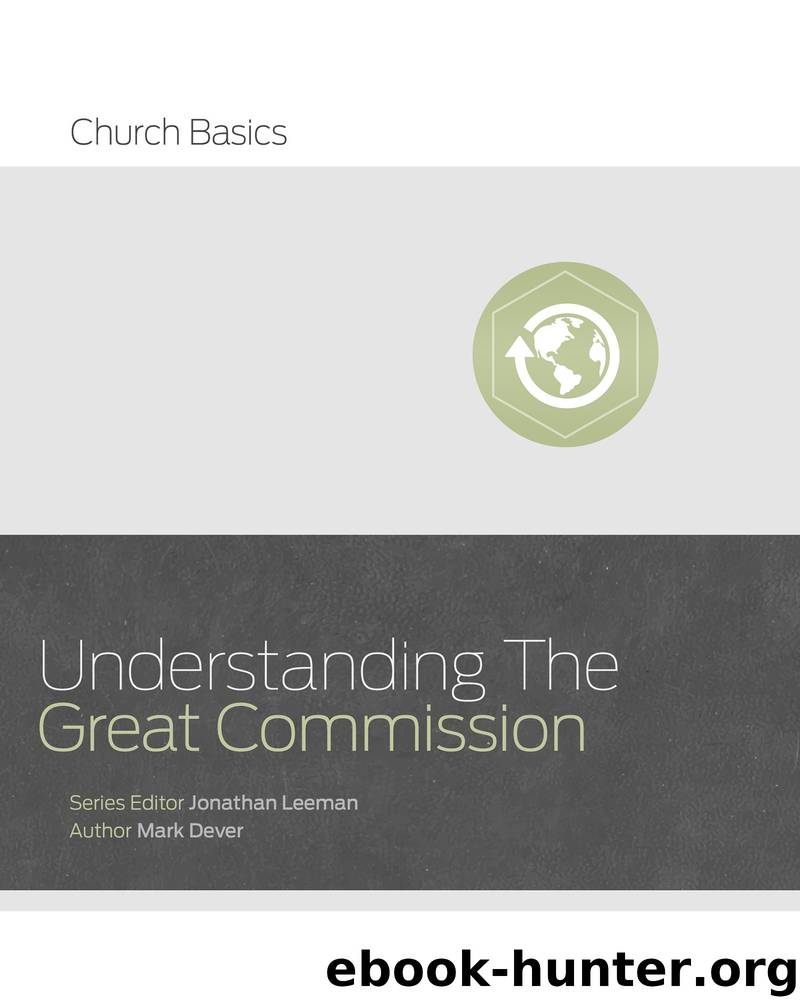Understanding the Great Commission by Leeman Jonathan;Dever Mark; & Mark Dever

Author:Leeman, Jonathan;Dever, Mark; & Mark Dever
Language: eng
Format: epub
Tags: Religion/Christian Ministry/Pastoral Resources
Publisher: B&H Publishing Group
Published: 2016-04-15T00:00:00+00:00
Letâs start with the pastors. Hebrews 13:17 says that pastors âkeep watch over your souls as those who will give an account.â So we pastors will give account to God. But for whom? For all Christians in the world? Certainly no. For all the Christians in a city? No again. Rather, pastors will give an account for the members of their church (see also James 3:1). And that means they will give an account for both particular individuals in the church (see Heb. 13:17) as well as the particular congregation as a whole (Acts 20:28; Eph. 4:11f; 1 Pet. 5:2â3). Pastors have a responsibility to me as an individual Christian, and they have responsibilities to the whole congregation. A faithful pastor looks after both.
The same is true if we stand at another point of the triangle and look toward the other two points. So I, the individual Christian, have a responsibility to obey particular pastors, not to all pastors everywhere (e.g., 1 Thess. 5:12â13; Heb. 13:7, 17). And I have a responsibility to love and encourage a particular congregation of Christians (e.g., Matt. 18:15â17; Rom. 14:19; 2 Cor. 2:6; Heb. 10:22â25; 1 John 1:3â4; cf. John 13:34â35).
Finally, standing at the third point, a particular congregation possesses the responsibility to recognize particular pastors and to support them (e.g., Rom. 10:15; 15:30; 1 Cor. 9:14; Gal. 6:6; Phil. 2:29; 1 Thess 5:12â13; 1 Tim. 4:3; 5:17â20; cf. Matt. 10:10). And it possesses responsibilities to love and encourage me, the individual Christian (e.g., Matt. 18:17; 1 Cor. 5:12).
Every one of these sets of obligations are things you can find in the New Testament. You just might spend an afternoon this weekend reading the book of Acts and trying to fill in that triangle!
A Self-Conscious Commitment
The larger point is, it would be impossible to fulfill quite a few of the New Testamentâs commands like these without the self-conscious commitment of church membership (see also Phil. 2:8; Rom. 12:3, 16).
The New Testament calls Christians to love one another (1 Cor. 14:1; John 13:34â35). It calls us to examine ourselves and one another (Rev. 3:17; 2 Cor. 13:5; Gal. 5:19â23; 1 John 3:14; 4:1â3, 20â21). It calls us to obey our leaders (1 Thess. 5:12â13; Heb. 13:7, 17; 1 Pet. 5:5). All of this happens not just in a series of relationships with your friendsâeven pagans have friendsâbut in local churches. Self-conscious membership is necessary for biblical discipleship, and it gives a specific shape to our discipleship.
So, if we want to fulfill the Great Commission, then normally we must pursue the work of church planting in one form or another. Engendering these kinds of groups of people with these self-conscious commitments is how we make disciples and teach people to obey everything Jesus commanded.
The Commission and the Ordinances
Does the Great Commission envision such a self-conscious commitment? Yes, it does itâto say it once againâthrough baptism.
What happens in that moment of baptism? Two individuals have to agree that they confess the same Christ, and that one person is joining with another in wearing the Jesus nametag.
Download
This site does not store any files on its server. We only index and link to content provided by other sites. Please contact the content providers to delete copyright contents if any and email us, we'll remove relevant links or contents immediately.
| Church Administration | Church Growth |
| Church History | Church Institutions & Organizations |
| Church Leadership | Church Materials |
| Clergy | Ecclesiology |
| Ministry to the Sick & Bereaved | Pastoral Resources |
Fangirl by Rainbow Rowell(9253)
How to Bang a Billionaire by Alexis Hall(8156)
Wonder by R. J. Palacio(8113)
The Thirst by Nesbo Jo(6944)
The Space Between by Michelle L. Teichman(6941)
Assassin’s Fate by Robin Hobb(6223)
Wiseguy by Nicholas Pileggi(5787)
The Night Circus by Erin Morgenstern(5224)
Paper Towns by Green John(5191)
The Kite Runner by Khaled Hosseini(5180)
Bittersweet (True North #1) by Sarina Bowen(4845)
Gerald's Game by Stephen King(4654)
Too Much and Not the Mood by Durga Chew-Bose(4348)
Pillow Thoughts by Courtney Peppernell(4284)
Goodbye Paradise(3810)
Twelve Days of Christmas by Debbie Macomber(3567)
Good by S. Walden(3560)
The Rosie Effect by Graeme Simsion(3468)
The Cellar by Natasha Preston(3345)
